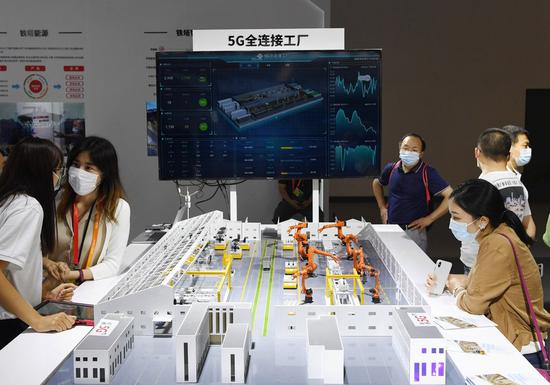
Visitors look at the model of a 5G-enabled factory during the 2020 China International Fair for Trade in Services (CIFTIS) in Beijing, Sept 6, 2020. (Photo/Xinhua) Efforts will be made to speed up 5G and high-tech transformation China will step up its push to cooperate with fellow BRICS partners-Brazil, Russia, India and South Africa-to stabilize global supply and industrial chains, with a focus on leveraging the industrial internet and smart manufacturing to empower traditional sectors, said the nation's top industry regulator on Monday. Xiao Yaqing, minister of industry and information technology, said via a video link at the 6th BRICS Industry Ministers Meeting that the ministry will boost ties with its BRICS counterparts of partners to build an industrial cooperation network within the bloc to promote circulation of capital, goods, talent and technology so as to form a shared community in industrial and supply chains. More efforts will be made to speed up digital transformation, accelerate the integration and application of emerging technologies such as the industrial internet and 5G with manufacturing, and boost experience and knowledge-sharing among BRICS countries so as to jointly create an open, fair and just development environment, Xiao said. The comments came as the COVID-19 pandemic continues to spread globally, and the resilience and stability of global industrial and supply chains have not been fully restored following disruptions over the past two years. Aware of the challenges and uncertainties ahead, a joint declaration from the meeting highlighted the importance of fully unleashing the potential of new-generation information and communications technologies to transform and upgrade traditional industries, especially manufacturing, in achieving higher output at lower cost, thus promoting sustainable development and inclusive growth. The joint declaration emphasized the promotion of new business models such as network-based collaborative manufacturing, personalized customization, as well as remote operation and maintenance services. It also underlined the importance of collectively fostering an enabling and innovative ecosystem with a cluster of innovative resources and dynamic market entities and delivering new drivers for digitalization of industries in BRICS countries. Li Dongsheng, founder and chairman of Chinese consumer electronics giant TCL Technology Group Corp, said the industrial internet is like a bridge connecting traditional industrial manufacturing on one end with new generation information technology on the other. The industrial internet is providing common development opportunities for countries around the world to achieve green economic recovery and sustainable development in the new era, Li said at the opening ceremony of the BRICS Forum on Development of Industrial Internet and Digital Manufacturing, which kicked off in Xiamen, Fujian province, on Monday. In recent years, TCL has expanded overseas factories making televisions, modules and photovoltaic cells in Vietnam, Malaysia, Mexico and India. It established ventures with local partners in Brazil to jointly build production bases, supply chains and a research and development system. According to a report on the competitiveness of BRICS nations released by the China Science and Technology Exchange Center, the export value of high-tech products from BRICS countries totaled $6 trillion in 2020 and accounted for over 25 percent of such products globally. BRICS countries' annual R&D investment for scientific and technological innovations accounted for over 16.7 percent of the global total in 2020, the report said. The comprehensive innovation index of BRICS countries will grow 1.5 percent annually on average in the coming years, it said. The average annual rate is 2.8 percent in G20 economies. |
Powered by Discuz! X3.4
© 2001-2013 Comsenz Inc.